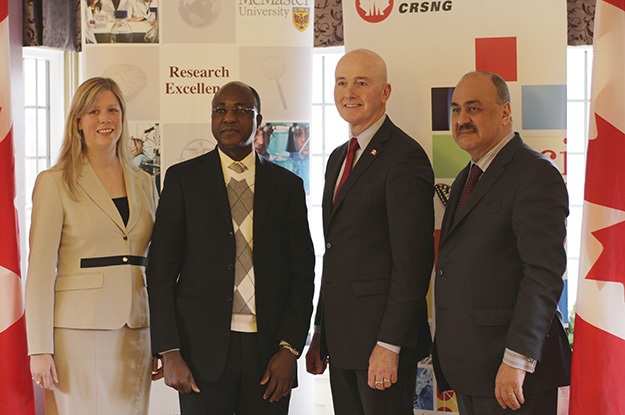David Sweet: ‘McMaster is at the forefront of so many innovations’

David Sweet, Member of Parliament for Ancaster-Dundas-Flamborough-Westdale (second from right), visited McMaster on Friday to announce $5 million over five years to support the FloodNet network, which will develop advanced warning systems to help protect Canadians from the often devastating effects of floods. McMaster's Paulin Coulibaly (second from left) is leading the research efforts.
A new research network led by McMaster’s Paulin Coulibaly will receive significant support from the Government of Canada to help develop flood forecasting systems.
McMaster will receive $5 million over five years to support the FloodNet network, which will develop advanced warning systems to help protect Canadians from the often devastating effects of floods.
Currently, no advanced flood alert system is available in Canada.
David Sweet, Member of Parliament for Ancaster-Dundas-Flamborough-Westdale, on behalf of the Honourable Ed Holder, Minister of State (Science and Technology), made the announcement at McMaster on Friday.
“McMaster University is at the forefront of so many innovations. The network being supported here today for flood forecasting is another excellent example,” said Sweet.
“It will help address the critical issue of river flooding in Canada while also spurring innovation — a key to continued economic growth. Through initiatives like this, Canada is translating knowledge into practical applications to improve our wealth, wellness, and well-being.”
Coulibaly, a McMaster professor jointly appointed in the School of Geography & Earth Sciences and Department of Civil Engineering, will work with University of Guelph, Université Laval, University of Manitoba, Université de Moncton, University of New Brunswick, University of Saskatchewan, Trent University, University of Waterloo and University of Western to fill this gap by developing flood forecasting systems.
“The direct benefits of enhanced flood forecasts and management for Canadians are tremendous and include the reduced cost of damages, the protection of people and livestock, the reduction of socio-economic impacts and human distress and the protection of community water systems,” said Coulibaly.
“In Canada, floods are recognized as the most common, largely distributed natural hazard to life, property, economy, and community/industry water systems. There is critical need to enhance flood forecasting and management capacity in Canada especially in a context of climate change.”
Mo Elbestawi, vice-
“The NSERC Strategic Partnership Grants reflect the McMaster brand of research — that is working together with private and public sector partners to ensure our work is relevant, adds value and improves the quality of life for Canadians. FloodNet, under Paulin Coulibaly’s leadership, will not only deal with the devastating effects of floods, but will train the next generation of leaders in this critical area of research.”
Also announced on Friday, the University of Toronto will receive funding for the Industrial Biocatalysis Network. This network will explore new ways to use enzymes to produce more environmentally friendly chemicals, plastics and other products.
Other network partners include AeroScribe Consulting, Corrugated Steel Pipe Institute, Credit Valley Conservation, Deltares USA Inc. DHI (Canada), Hydro-Québec, Manitoba Hydro, Ontario Climate Consortium, Ontario Power Generation Inc, among others.
NSERC Strategic Network Grants support large-scale, multidisciplinary research projects that require collaboration between academic researchers, organizations and companies across Canada to address challenges facing a particular industry over the next 10 years.

